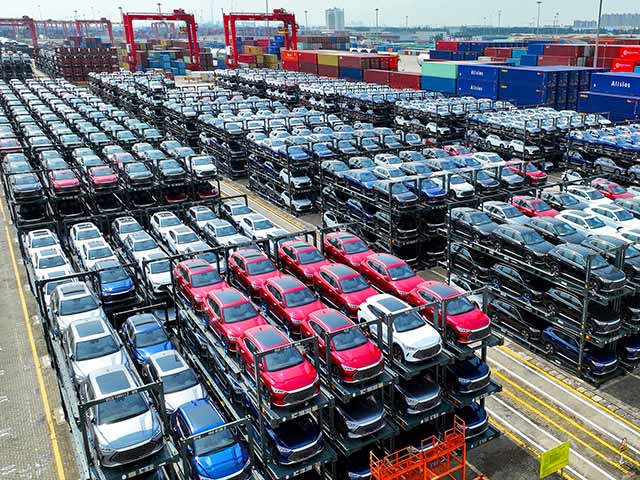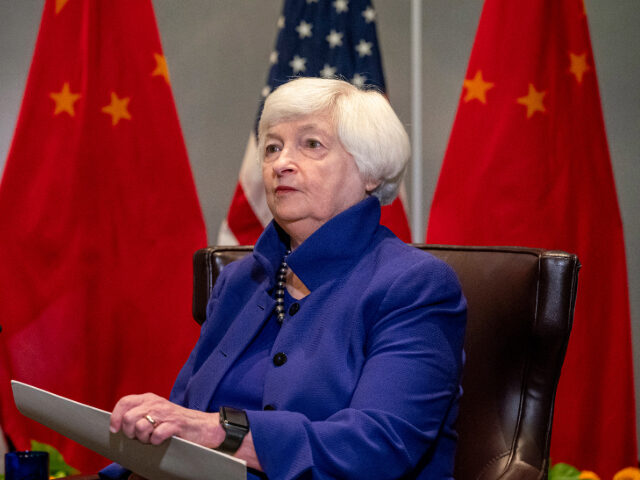U.S. Treasury Secretary Janet Yellen concluded four days of meetings in Beijing on Monday by declaring that the Biden administration would “not accept” the People’s Republic of China (PRC) destroying American industries with a flood of cheap exported goods. She was rather vague about exactly how the administration would stop it.
“We’ve seen this story before. Over a decade ago, massive PRC government support led to below-cost Chinese steel that flooded the global market and decimated industries across the world and in the United States,” Yellen said at a press conference as she prepared to leave Beijing.
“When the global market is flooded by artificially cheap Chinese products, the viability of American and other foreign firms is put into question,” she explained.
“I’ve made it clear that President Biden and I will not accept that reality again,” she said.
Chinese Vice Finance Minister Liao Min airily blew off Yellen’s warning, insisting that his government has “fully responded” to the Biden administration’s concerns, and, in fact, has some “grave concerns” of its own with American trade restrictions — especially the “escalation of green protectionist measures.”
“China will not sit idly and ignore it,” Liao said, precisely echoing Yellen’s insistence that the Biden administration will not accept a new “China shock” of cheap government-subsidized exports.
At roughly the same time Yellen and Liao were exchanging warning shots, Chinese Commerce Minister Wang Wentao declared from a meeting in Paris that “accusations from the US and EU about China’s overcapacity are groundless.”
Wang was talking about the electric vehicle (EV) industry, which could be the most interesting one to watch as the saga of “China Shock 2.0” unfolds. Wang rejected allegations of government-subsidized product dumping, insisting that China’s EV industry is flourishing due to “constant innovations.”
China is poised to dramatically undercut prices on American-made EVs, which the public is not much interested in buying anyway, potentially wiping out a nascent industry that has devoured billions of dollars in taxpayer subsidies over the past two decades.
Americans were forced to lavishly subsidize EVs, and they are increasingly being pressured to buy them, but Chinese companies, like the titanic BYD, could easily flood the U.S. market with electric cars at prices that would drive every American automaker into bankruptcy. Electric car sales are slowing in China, too, and that could only make the problem worse because China would be left with a vast inventory of vehicles it could dump at fire-sale prices.

BYD electric cars waiting to be loaded on a ship are stacked at the international container terminal of Taicang Port at Suzhou Port in China’s eastern Jiangsu Province on September 11, 2023. (AFP via Getty Images)
The auto industry, and its politically powerful unionized workforce, probably have enough clout to keep American markets closed to Chinese electric vehicles. Yellen also said she “wouldn’t rule out” heavy tariffs to protect “green” industries, such as solar panels. Other industries might not be so lucky.
“I’m not thinking so much of export restrictions, as some shifts in their macroeconomic policy, and a reduction in the amount of, particularly local government subsidies, to firms,” Yellen said in a CNBC interview on Monday.
“We just want to make sure that we’re not driven out of business, and that our firms and workers have opportunities in these industries which will be important ones in our future,” she insisted.
Yellen said she had some “difficult conversations” in Beijing, especially about China’s industrial overcapacity — its ability to crank out mountains of merchandise at unbeatable prices thanks to huge government-subsidized factories, cheap labor, and low regulatory costs.
Yellen also said her Chinese hosts were displeased with the U.S. position on Chinese electronics and software products posing a “national security” risk.
The Chinese government and corporate officials resolutely insist their products are absolutely safe and would not be abused for espionage by the authoritarian regime in Beijing, assurances that no one outside of China believes for an instant. The latest flashpoint in this conversation is the electric vehicle industry since the latest generation of cars is heavily “connected” with electronics and online connections that could be abused for espionage.
Yellen’s meetings concluded with boilerplate from both sides about a steadily improving relationship between the U.S. and China, but the only concrete issue the two sides seemed to agree on was the need to combat money laundering — and even that seemed like an initiative cobbled together to show “some kind of deliverables to the media and to the public” from Yellen’s China trip, as Hong Kong Baptist University professor emeritus Jean-Pierre Cabestan put it.

COMMENTS
Please let us know if you're having issues with commenting.